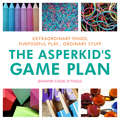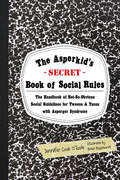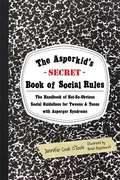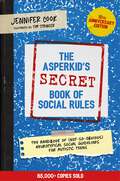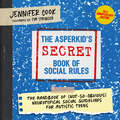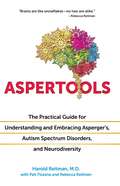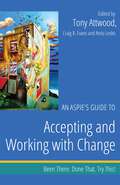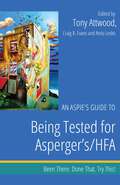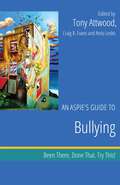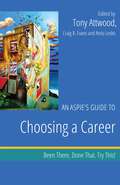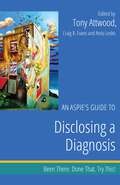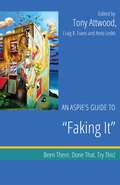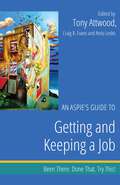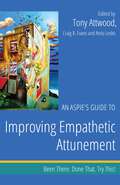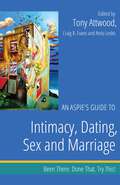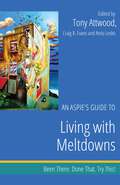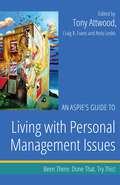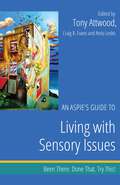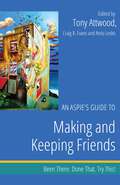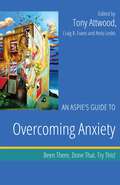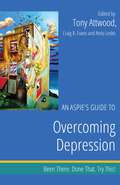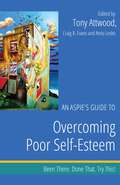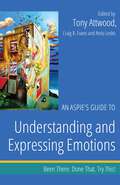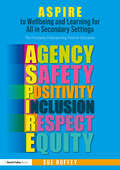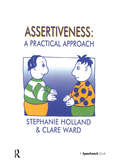- Table View
- List View
The Asperkid's Game Plan: Extraordinary Minds, Purposeful Play... Ordinary Stuff
by Jennifer Cook O'TooleThe Asperkid's Game Plan looks from the inside at the learning style of children with Asperger syndrome and explains how to introduce structured play that engages Asperkids and explicitly addresses ASD weaknesses while reinforcing ASD strengths. Showing how just about anything can be turned into an opportunity for learning and growth, the book is full of go-to ideas for making simple play equipment in the home or classroom and using it to develop core skills that Asperkids struggle with, from fine motor and social skills, to planning and organization. Whether it's origami math, fried marbles, or a bug's eye view scavenger hunt, every game, project, and idea in the book is explained with clear directions and learning objectives and illustrated with color photographs. Jennifer O'Toole's enthusiastic approach and fun lessons, based on Montessori principles, will inspire and motivate parents, educators, and therapists to make purposeful play a part of every Asperkid's day.
The Asperkid's (Secret) Book of Social Rules: The Handbook of Not-So-Obvious Social Guidelines for Tweens and Teens with Asperger Syndrome
by Brian Bojanowski Jennifer Cook O'TooleBeing a teen or tween isn't easy for anyone but it can be especially tough for Asperkids. Jennifer O'Toole knows; she was one! This book is a top secret guide to all of the hidden social rules in life that often seem strange and confusing to young people with Asperger syndrome. The Asperkid's (Secret) Book of Social Rules offers witty and wise insights into baffling social codes such as making and keeping friends, blending in versus standing out from the crowd, and common conversation pitfalls. Chock full of illustrations, logical explanations, and comic strip practice sessions, this is the handbook that every adult Aspie wishes they'd had growing up. Ideal for all 10-17 year olds with Asperger syndrome, this book provides inside information on over thirty social rules in bite-sized chunks that older children will enjoy, understand, and most importantly use daily to navigate the mysterious world around them.
The Asperkid's (Secret) Book of Social Rules: The Handbook of Not-So-Obvious Social Guidelines for Tweens and Teens with Asperger Syndrome
by Jennifer Cook O'TooleThis book is meant for asperkids and offers insights into baffling social codes such as making and keeping friends, blending in versus standing out from the crowd, and common conversation pitfalls, provides inside information on over thirty social rules in bite-sized chunks that older children can enjoy and understand.
The Asperkid's (Secret) Book of Social Rules, 10th Anniversary Edition: The Handbook of (Not-So-Obvious) Neurotypical Social Guidelines for Autistic Teens
by Jennifer CookBeing a teen or tween is tough for anyone. And if you're on the Autism Spectrum, life can feel like a game you're playing without knowing the rules. Jennifer Cook knows - she's been there! Her internationally bestselling handbook is the key to unlocking those unwritten, often confusing, not-so-obvious social guidelines and bolstering confidence, all at once. Finally, teens can play the game of life with instructions. The 10th Anniversary Edition of The (Secret) Book of Social Rules reveals the essential secrets behind the baffling social codes surrounding making and keeping friends, dating, and catastrophic conversation pitfalls, with all-new content on social media and talking about neurodiversity. It's no wonder Jennifer's is the navigation tool tens of thousands of fans have come to love! Full of brand-new funny illustrations, take-it-from-me explanations, and comic strip examples, this Book of the Year award winner is real, positive, and speaks from the heart (without ever sounding like your mother's guide to manners). It's confidence, humor, and smarts. For the Human Spectrum.
The Asperkid's (Secret) Book of Social Rules, 10th Anniversary Edition: The Handbook of (Not-So-Obvious) Neurotypical Social Guidelines for Autistic Teens
by Jennifer CookThe new 10th anniversary edition of bestselling autistic teen guide to social rules.Being a teen or tween is tough for anyone. And if you're on the Autism Spectrum, life can feel like a game you're playing without knowing the rules. Jennifer Cook knows - she's been there! Her internationally bestselling handbook is the key to unlocking those unwritten, often confusing, not-so-obvious social guidelines and bolstering confidence, all at once. Finally, teens can play the game of life with instructions. The 10th Anniversary Edition of The (Secret) Book of Social Rules reveals the essential secrets behind the baffling social codes surrounding making and keeping friends, dating, and catastrophic conversation pitfalls, with all-new content on social media and talking about neurodiversity. It's no wonder Jennifer's is the navigation tool tens of thousands of fans have come to love! Full of take-it-from-me explanations this Book of the Year award winner is real, positive, and speaks from the heart (without ever sounding like your mother's guide to manners). It's confidence, humor, and smarts. For the Human Spectrum.(P) 2022 Jessica Kingsley Publishers
Aspertools: The Practical Guide for Understanding and Embracing Asperger's, Autism Spectrum Disorders, and Neurodiversity
by Dr. Harold ReitmanIf you ask Dr. Harold Reitman, labels are a lousy way to describe a unique human being, whether it's Asperger's, high functioning autism, ADHD, dyslexia, Tourette's or even the so-called neurotypical brain itself. One size does not fit all. Everyone's brain is different. Helping others 'get it' when it comes to dealing with those with so-called learning disabilities is why Reitman has written this book. It's also why he wrote and produced The Square Root of 2, a movie about a college student who encounters—and fights—her school's unjust system. The film was inspired by the real events faced by his daughter and contributing author, Rebecca, when she went to college; her seizure disorder and—at the time—undiagnosed Asperger syndrome posed unique challenges not faced by most students. After reviewing the scientific community's research, conducted over the last nearly 40 years, Dr. Reitman believes that it's time to not just accept neurodiversity, but to embrace it, and this book will help people do just that. It is the first book to offer simple tools, action plans and resources to help understand and deal with anyone whose brain is a bit different. The astonishing rate of autism births alone (1 in 68) means that society will have to adapt to neurodiversity, just as it has had to adapt to other cultural and racial differences. Our educational system, our workplaces, and society at large will no longer be one size fits all—each individual will have the opportunity to maximize their potential—and we will be the better for it.
An Aspie’s Guide to Accepting and Working with Change: Been There. Done That. Try This!
by Craig Evans Anita Lesko Tony AttwoodChange is a key daily stressor for people with Asperger's Syndrome and this ebook is packed with advice from Aspie mentors who have all been there, done that, and offer suggestions for coping strategies that really work. Temple Grandin, Lars Perner, Liane Holliday Willey, and more offer guidance based on their personal experiences of accepting and working with change and the ebook ends with professional analysis and recommendations from world expert Dr. Tony Attwood. This inspirational advice comes from the bestselling book Been There. Done That. Try This!, written by Aspies for Aspies, now available in short Aspie Mentor Guides!
An Aspie’s Guide to Being Tested for Asperger's/HFA: Been There. Done That. Try This!
by Craig Evans Anita Lesko Tony AttwoodWhether or not to seek an official diagnosis is a key daily stressor for people with Asperger's Syndrome and this ebook is packed with advice from Aspie mentors who have all been there, done that, and offer suggestions on the pros and cons of being tested for Asperger's/HFA. Anita Lesko, Henny Kupferstein, Jeanette Purkis, and more offer guidance based on their personal experiences of seeking formal diagnosis and the ebook ends with professional analysis and recommendations from world expert Dr. Tony Attwood. This inspirational advice comes from the bestselling book Been There. Done That. Try This!, written by Aspies for Aspies, now available in short Aspie Mentor Guides!
An Aspie’s Guide to Bullying: Been There. Done That. Try This!
by Craig Evans Anita Lesko Tony AttwoodBullying is a key daily stressor for people with Asperger's Syndrome and this ebook is packed with advice from Aspie mentors who have all been there, done that, and offer suggestions for coping strategies that really work. Alexis Wineman, Anita Lesko, Karen Krejcha, and more offer guidance based on their personal experiences of overcoming bullying and the ebook ends with professional analysis and recommendations from world expert Dr. Tony Attwood. This inspirational advice comes from the bestselling book Been There. Done That. Try This!, written by Aspies for Aspies, now available in short Aspie Mentor Guides!
An Aspie’s Guide to Choosing a Career: Been There. Done That. Try This!
by Craig Evans Anita Lesko Tony AttwoodChoosing the right career is a key daily stressor for people with Asperger's Syndrome and this ebook is packed with advice from Aspie mentors who have all been there, done that, and offer career guidance that really work. Lars Perner, Anita Lesko, Debbie Denenburg, and more offer guidance based on their personal experiences of choosing a career and the ebook ends with professional analysis and recommendations from world expert Dr. Tony Attwood. This inspirational advice comes from the bestselling book Been There. Done That. Try This!, written by Aspies for Aspies, now available in short Aspie Mentor Guides!
An Aspie’s Guide to Disclosing a Diagnosis: Been There. Done That. Try This!
by Craig Evans Anita Lesko Tony AttwoodDisclosing a diagnosis is a key daily stressor for people with Asperger's Syndrome and this ebook is packed with advice from Aspie mentors who have all been there, done that, and offer suggestions for disclosure strategies that really work. Qazi Fazli Azeem, Mary Robison, Anita Lesko and more offer guidance based on their personal experiences of disclosing to friends, family and employers and the ebook ends with professional analysis and recommendations from world expert Dr. Tony Attwood. This inspirational advice comes from the bestselling book Been There. Done That. Try This!, written by Aspies for Aspies, now available in short Aspie Mentor Guides!
An Aspie’s Guide to "Faking It": Been There. Done That. Try This!
by Craig Evans Anita Lesko Tony AttwoodIn order to survive in a Neurotypical world many Aspies feel that they need "fake it" and intentionally wear a mask and play a role so that people will not see who they really are. This can be exhausting and "faking it" is a key daily stressor for people with Asperger's Syndrome. This ebook is packed with advice from Aspie mentors who have all been there, done that, and offer suggestions for coping strategies that really work. Liane Holliday Willey, Jennifer Cook O'Toole, Karen Krejcha and more offer guidance based on their personal experiences of "faking it" and the ebook ends with professional analysis and recommendations from world expert Dr. Tony Attwood. This inspirational advice comes from the bestselling book Been There. Done That. Try This!, written by Aspies for Aspies, now available in short Aspie Mentor Guides!
An Aspie’s Guide to Getting and Keeping a Job: Been There. Done That. Try This!
by Craig Evans Anita Lesko Tony AttwoodGetting and keeping a job is a key daily stressor for people with Asperger's Syndrome and this ebook is packed with advice from Aspie mentors who have all been there, done that, and offer suggestions for employment strategies that really work. Temple Grandin, Richard Maguire, Anita Lesko and more offer guidance based on their personal jobhunting and employment experiences and the ebook ends with professional analysis and recommendations from world expert Dr. Tony Attwood. This inspirational advice comes from the bestselling book Been There. Done That. Try This!, written by Aspies for Aspies, now available in short Aspie Mentor Guides!
An Aspie’s Guide to Improving Empathetic Attunement: Been There. Done That. Try This!
by Craig Evans Anita Lesko Tony AttwoodDifficulties with feeling empathy or being perceiving to have a lack of empathy is a key daily stressor for people with Asperger's Syndrome and this ebook is packed with advice from Aspie mentors who have all been there, done that, and offer strategies that really work to improve empathetic attunement. Dr. Patrick Suglia, Paul Isaacs, Anita Lesko, and more offer guidance based on their personal experiences and the ebook ends with professional analysis and recommendations from world expert Dr. Tony Attwood. This inspirational advice comes from the bestselling book Been There. Done That. Try This!, written by Aspies for Aspies, now available in short Aspie Mentor Guides!
An Aspie’s Guide to Intimacy, Dating, Sex and Marriage: Been There. Done That. Try This!
by Craig Evans Anita Lesko Tony AttwoodIntimacy, dating, sex and marriage are key daily stressors for people with Asperger's Syndrome and this ebook is packed with advice from Aspie mentors who have all been there, done that, and offer suggestions for relationship strategies that really work. Jennifer Cook O'Toole, Jeanette Purkis, Richard Maguire and more offer guidance based on their personal dating and relationship experiences and the ebook ends with professional analysis and recommendations from world expert Dr. Tony Attwood. This inspirational advice comes from the bestselling book Been There. Done That. Try This!, written by Aspies for Aspies, now available in short Aspie Mentor Guides!
An Aspie’s Guide to Living with Meltdowns: Been There. Done That. Try This!
by Craig Evans Anita Lesko Tony AttwoodMeltdowns are a key daily stressor for people with Asperger's Syndrome and this ebook is packed with advice from Aspie mentors who have all been there, done that, and offer suggestions for coping strategies that really work. Mitch Christian, Anita Lesko, Dr. Patrick Suglia, and more offer guidance based on their personal experiences of managing meltdowns and the ebook ends with professional analysis and recommendations from world expert Dr. Tony Attwood. This inspirational advice comes from the bestselling book Been There. Done That. Try This!, written by Aspies for Aspies, now available in short Aspie Mentor Guides!
An Aspie’s Guide to Living with Personal Management Issues: Been There. Done That. Try This!
by Craig Evans Anita Lesko Tony AttwoodPersonal management issues such as organization and decision-making are a key daily stressor for people with Asperger's Syndrome and this ebook is packed with advice from Aspie mentors who have all been there, done that, and offer suggestions for coping strategies that really work. Mary Robison, Anita Lesko, Lars Perner and more offer guidance based on their personal experiences of coping with personal management issues and the ebook ends with professional analysis and recommendations from world expert Dr. Tony Attwood. This inspirational advice comes from the bestselling book Been There. Done That. Try This!, written by Aspies for Aspies, now available in short Aspie Mentor Guides!
An Aspie’s Guide to Living with Sensory Issues: Been There. Done That. Try This!
by Craig Evans Anita Lesko Tony AttwoodSensory issues are a key daily stressor for people with Asperger's Syndrome and this ebook is packed with advice from Aspie mentors who have all been there, done that, and offer suggestions for coping strategies that really work. Paul Isaacs, Lars Perner, Dr. Stephen M. Shore, and more offer guidance based on their personal experiences of living with sensory issues and the ebook ends with professional analysis and recommendations from world expert Dr. Tony Attwood. This inspirational advice comes from the bestselling book Been There. Done That. Try This!, written by Aspies for Aspies, now available in short Aspie Mentor Guides!
An Aspie’s Guide to Making and Keeping Friends: Been There. Done That. Try This!
by Craig Evans Anita Lesko Tony AttwoodFriendship problems are a key daily stressor for people with Asperger's Syndrome and this ebook is packed with advice from Aspie mentors who have all been there, done that, and offer suggestions for social strategies that really work. Anita Lesko, Lisa Morgan, Jennifer Cook O'Toole, and more offer guidance based on their personal experiences of making and keeping friends and the ebook ends with professional analysis and recommendations from world expert Dr. Tony Attwood. This inspirational advice comes from the bestselling book Been There. Done That. Try This!, written by Aspies for Aspies, now available in short Aspie Mentor Guides!
An Aspie’s Guide to Overcoming Anxiety: Been There. Done That. Try This!
by Craig Evans Anita Lesko Tony AttwoodAnxiety is a key daily stressor for people with Asperger's Syndrome and this ebook is packed with advice from Aspie mentors who have all been there, done that, and offer suggestions for coping strategies that really work. Liane Holliday Willey, Anita Lesko, Jennifer Cook O'Toole, and more offer guidance based on their personal experiences of dealing with anxiety and the ebook ends with professional analysis and recommendations from world expert Dr. Tony Attwood. This inspirational advice comes from the bestselling book Been There. Done That. Try This!, written by Aspies for Aspies, now available in short Aspie Mentor Guides!
An Aspie’s Guide to Overcoming Depression: Been There. Done That. Try This!
by Craig Evans Anita Lesko Tony AttwoodDepression is a key daily stressor for people with Asperger's Syndrome and this ebook is packed with advice from Aspie mentors who have all been there, done that, and offer suggestions for coping strategies that really work. Temple Grandin, Qazi Fazli Azeem, Ruth Elaine Joyner Hane, and more offer guidance based on their personal experiences of overcoming depression and the ebook ends with professional analysis and recommendations from world expert Dr. Tony Attwood. This inspirational advice comes from the bestselling book Been There. Done That. Try This!, written by Aspies for Aspies, now available in short Aspie Mentor Guides!
An Aspie’s Guide to Overcoming Poor Self-Esteem: Been There. Done That. Try This!
by Craig Evans Anita Lesko Tony AttwoodLow self-esteem is a key daily stressor for people with Asperger's Syndrome and this ebook is packed with advice from Aspie mentors who have all been there, done that, and offer suggestions for coping strategies that really work. Alexis Wineman, Liane Holliday Willey, Anita Lesko, and more offer guidance based on their personal experiences of boosting their self-esteem and self-confidence and the ebook ends with professional analysis and recommendations from world expert Dr. Tony Attwood. This inspirational advice comes from the bestselling book Been There. Done That. Try This!, written by Aspies for Aspies, now available in short Aspie Mentor Guides!
An Aspie’s Guide to Understanding and Expressing Emotions: Been There. Done That. Try This!
by Craig Evans Anita Lesko Tony AttwoodUnderstanding and expressing emotions is a key daily stressor for people with Asperger's Syndrome and this ebook is packed with advice from Aspie mentors who have all been there, done that, and offer suggestions for strategies that really work. Ruth Elaine Joyner Hane, Steve Selpal, Anita Lesko and more offer guidance based on their personal experiences overcoming emotional difficulties and the ebook ends with professional analysis and recommendations from world expert Dr. Tony Attwood. This inspirational advice comes from the bestselling book Been There. Done That. Try This!, written by Aspies for Aspies, now available in short Aspie Mentor Guides!
ASPIRE to Wellbeing and Learning for All in Secondary Settings: The Principles Underpinning Positive Education
by Sue RoffeyThis truly accessible resource shows secondary school practitioners how to help make every child and young person feel like they really matter when they are in school, so they can develop confidence, resilience, love of learning, a positive sense of self and healthy relationships. Sue Roffey shows how to create a learning environment where all pupils can thrive and make progress in learning, and where wellbeing for everyone is at the heart of every school. By using the unique evidence-based ASPIRE principles of Agency, Safety, Positivity, Inclusion, Respect and Equity in practice, this insightful book shows teachers how to redress the balance in ways that maximise a love for learning, build a positive sense of self, construct healthy relationships, foster resilience and help young people make good choices. This resource features a chapter for each principle which explores what this means, why it matters and how it can be applied across secondary schools. Although visionary, the book is based on both substantial evidence and good practice, with each chapter supported by case-studies across the world. The book demonstrates the positive difference each principle makes to children in secondary school settings as well as teachers, parents and the overall community. It is a must-read for secondary school teachers, tutors, school leaders, psychologists, parents and anyone who wants an education system that is inclusive, holistic and effective for all students.
Assertiveness: A Practical Approach
by Clare Ward Stephanie HollandThis highly successful title offers an opportunity for professionals from all backgrounds to develop an understanding of assertiveness, which has been shown to be therapeutically advantageous for all kinds of client groups and can be useful in many contexts. It is a highly practical working manual from which you can apply the principles of assertiveness, both to yourself and to your clients.
